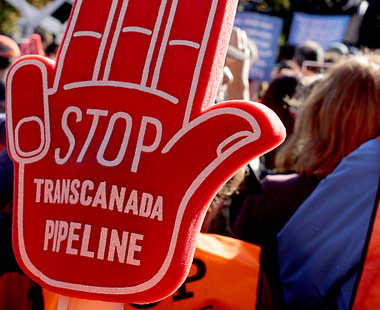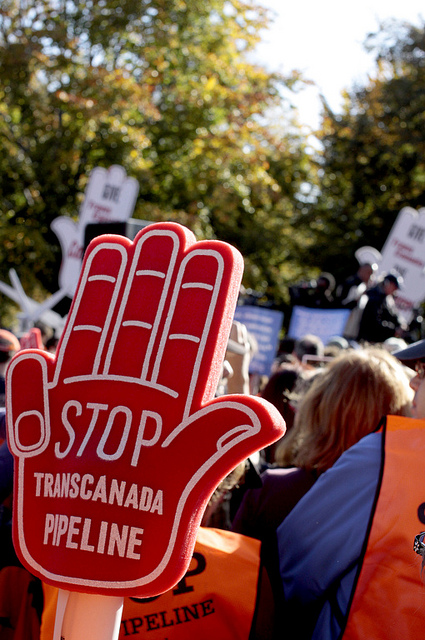In October 2011, National Journal surveyed energy experts about whether Obama was likely to approve the Keystone XL pipeline, which would carry Canadian tar-sands oil through the U.S. to the Gulf of Mexico. Ninety-one percent of the “energy and environment insiders” believed he would.
On Wednesday, Obama proved them wrong.
How could the experts have gotten it so wrong? The answer is twofold: Grassroots environmentalists were stronger, and congressional Republicans dumber, than anyone predicted.
Back in August of 2011, when author and activist Bill McKibben staged the first anti-Keystone rallies around the White House, political observers scoffed. These were, after all, the same environmentalists who had been rendered irrelevant by their cap-and-trade defeat and the stress of economic recession. No way they could stop a fossil fuel infrastructure project with big money behind it.
But McKibben kept at it. The movement he seeded grew, forging strategic partnerships with Nebraska farmers, social-justice groups, and unions. Activists staged more rallies, hounded the president everywhere he went and uncovered serious questions about the relationship between the tar-sands industry and the State Department. As the crowds grew, big-money Democratic donors started weighing in on the issue. In November, under intense pressure, Obama announced that the final determination would be delayed until after the election. It was an unexpected display of muscle from the green grass roots.
Still, most observers assumed that Obama was just buying time (and the support of his environmental base) and would approve the pipeline in the spring. That’s where the dumb Republicans came in.
The GOP thought it had Obama in a trap — approve the pipeline and anger environmentalists, deny it and anger construction unions — and that the president had seemingly slipped out of that trap by delaying the decision. Infuriated, Republicans threatened to attach a rider to December’s payroll tax bill forcing Obama to make a decision within six months.
At that point, the administration made it clear that if Congress rushed it into a decision without adequate environmental review, it would reject the pipeline. Nonetheless, the GOP attached the rider to the bill. So yesterday, true to his word, Obama rejected the pipeline.
In other words, Republicans killed their own pet project. Maybe they thought they could bully Obama into submission, in which case they disastrously miscalculated. Or maybe they cared more about an election-year talking point than the pipeline itself. Either way, rank-and-file Republicans who genuinely wanted to see the pipeline built have every reason to be angry with their congressional leadership, which has again opted for tantrums over tangible policy victories.
The pipeline has not been killed for good, of course. Obama made it clear yesterday that he still believes in oil and gas development. TransCanada, the company behind the project, will reapply for a permit next year, so the battle may repeat itself then.
But for now, the fight is about who controls the message heading into November. On this, the experts are similarly unanimous: The GOP has the administration right where it wants it, stuck with yet another maddening choice of “jobs versus environment,” a dichotomy it’s happy to bring up through November.
But the experts have been wrong before (just a few paragraphs ago, in fact). The Keystone XL victory (along with the stunning reversal of momentum behind the Stop Online Piracy Act) shows that organizing still matters. Organizing brings money and intensity, which are the coin of the realm in politics. If the Keystone coalition is capable of a victory on policy, there’s no reason continued organizing can’t win a victory on messaging.
For the coalition winning that victory will mean going directly after its enemy’s purported strength: jobs. In a press conference denouncing Obama’s decision yesterday, Speaker of the House John Boehner claimed that canceling the pipeline would destroy tens of thousands of jobs. But the only independent study done on the matter, from the Cornell Global Labor Institute, found that the pipeline would create between 500 and 1,400 jobs, almost all temporary construction jobs. The State Department, meanwhile, estimates it would create 5,000 to 6,000 jobs.
By way of contrast, just a few months ago the GOP rallied to vote down the president’s American Jobs Act, which, according to a Moody’s Analytics estimate, would have created 1.9 million jobs. That a short-term pipeline project has become the heart of the GOP jobs program is a kind of reductio ad absurdum of the conservative economic agenda.
The pipeline also wouldn’t have served the (somewhat illusory) goal of “energy independence.” Americans will have no special claim on the oil piped through it. As recent reports have shown, the vast bulk of that oil will be exported to petro-hungry areas like Europe and Latin America. TransCanada officials have admitted in congressional testimony that opening Canada’s oil to export will boost its value and thus increase its price for Americans. More likely, any change in the price of oil or gasoline will be a faint signal lost amid natural fluctuations.
There are, of course, ways to create American jobs and strengthen American energy security. Most of them are under attack by the very same Republicans lamenting the loss of Keystone XL. For instance, the GOP has vowed to block extension of the Production Tax Credit that supports wind power developers. According to a study commissioned by the American Wind Energy Association (AWEA), that could lead to the loss of 37,000 jobs — good, permanent jobs. The Department of Energy’s loan guarantee program for renewables has, according to DOE, created 60,000 direct jobs in the wind and solar industries. The GOP is trying to kill it too. (Both AWEA and DOE have reason to trumpet their economic benefits, of course, but their numbers are generally taken seriously by investors.)
Supporters of clean energy can win the messaging battle if they can focus the conversation on what kind of jobs Americans want, which is to say, what kind of country Americans want. Do we want ephemeral jobs building oil infrastructure that overwhelmingly benefits those who happen to be sitting on top of the oil? Or do we want high-skill jobs in manufacturing, engineering, design, and a dozen other trades, in industries that will dominate the 21st century, with profits that stay in U.S. communities? Do we want to continue cooking the planet, or do we want to lead the way toward solutions?
Winning that messaging battle won’t be about cleverness — it will be about volume and repetition. Greens can never match the money behind fossil fuels, but as the Keystone XL fight has shown, they can out-organize and outmaneuver their opponents when they put their bodies and sweat into it. As long as they ignore the “experts,” they’ll be fine.




